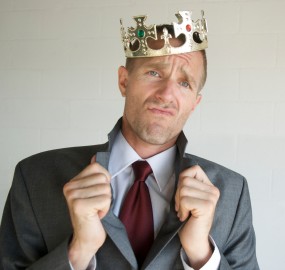Whenever a media event occurs that involves some sort of atrocity, the language of discussion involves power words. Human beings have an ingrained need to label, so the words we assign to horrific events and the people involved in them are the most powerful we elicit.
I’ve heard the word monster used often in the past week. A power word like that contrasts with the other labels we use, such as innocent. Labels help us make sense of the world, especially when tragedy strikes. The problem with labels is that we usually use them incorrectly. If anything, they become a means for us to distance ourselves from reality, a lie we tell ourselves to feel better in the midst of pain.
Evil demands labels because we want to make sense of it. We have a strange sense of fairness about how life should be, and most often evil is what we consider anything that robs life of its fairness. It’s a very American way of thinking.
For these reasons, we label perpetrators of evil as monsters, especially when that evil appears to us to be on a grand scale. Almost everyone considers Hitler a monster. So were Stalin and Mao. Anyone who preys on children is a monster, such as John Wayne Gacy or the Columbine shooters.
Though Americans are less of a religious folk than they used to be, if asked where those monsters are now, few would balk at claiming they are in hell. The ways in which monsters commit their crimes only furthers our belief that such people must be subjected to everlasting torment for us to feel that life is fair.
Here is what others say about genuine evil:
For I tell you, unless your righteousness exceeds that of the scribes and Pharisees, you will never enter the kingdom of heaven. “You have heard that it was said to those of old, ‘You shall not murder; and whoever murders will be liable to judgment.’ But I say to you that everyone who is angry with his brother will be liable to judgment; whoever insults his brother will be liable to the council; and whoever says, ‘You fool!’ will be liable to the hell of fire.
—Matthew 5:20-22 ESV“You have heard that it was said, ‘You shall not commit adultery.’ But I say to you that everyone who looks at a woman with lustful intent has already committed adultery with her in his heart.
—Matthew 5:27-28 ESVAs it is written: “None is righteous, no, not one; no one understands; no one seeks for God. All have turned aside; together they have become worthless; no one does good, not even one.” “Their throat is an open grave; they use their tongues to deceive.” “The venom of asps is under their lips.” “Their mouth is full of curses and bitterness.” “Their feet are swift to shed blood; in their paths are ruin and misery, and the way of peace they have not known.” “There is no fear of God before their eyes.” Now we know that whatever the law says it speaks to those who are under the law, so that every mouth may be stopped, and the whole world may be held accountable to God.
—Romans 3:10-19 ESV
In the end, the truth is inescapable: Each of us is a monster.
The Nazi Final Solution happened because thousands or even millions of people just like you and me were complicit in sending other people to their deaths. A nameless, faceless man at a desk initialed an order that killed families by the hundreds, then he went home and ate a meal with his own family. He was just doing his job. They executed the generals and commandants when the war was over, but the guy who initialed the papers went unjudged. Or so we think.
The rhetoric of evil in the America today makes no room for the thought that we too swiftly judge the obvious monsters and excuse ourselves. We condemn those who use guns to kill, but we make excuses for ourselves when we use words that kill the spirits of others and often trap them in a living hell for the rest of their natural lives. The young girl who is called ugly. The boy subjected to a morose father’s beatings. The people we crush without thinking, mostly to make ourselves feel superior or to demonstrate our illusory power.
Each of us is a monster.
Even if you have no pretenses to any kind of religious thought, it doesn’t excuse the fact that human beings, even the most vanilla of us, are capable of the most sickening acts. We lay aside our fairness and brotherhood quite easily. The monster lurks perpetually within.
Perhaps you have heard of the Stanford Prison Experiment. If not, I invite you to watch this video excerpted from a documentary on the subject. The video contains nudity and obscenities, but then those obscenities are always lurking beneath the surface of our lives:
If we can draw any wisdom from this experiment, it is that even the most upright of us is capable of atrocities given the right circumstances.
We can talk all we want about the hows and whys of acts of terror and evil, but it is just a cover for the greater problem: that each of us is capable of those same atrocities. We should not deceive ourselves about the ease with which we commit small atrocities daily. Nor should we convince ourselves that the larger acts of evil, the ones that grab the news headlines, are not bubbling in our hearts.
Again, someone addressed this:
There were some present at that very time who told him about the Galileans whose blood Pilate had mingled with their sacrifices. And he answered them, “Do you think that these Galileans were worse sinners than all the other Galileans, because they suffered in this way? No, I tell you; but unless you repent, you will all likewise perish. Or those eighteen on whom the tower in Siloam fell and killed them: do you think that they were worse offenders than all the others who lived in Jerusalem? No, I tell you; but unless you repent, you will all likewise perish.”
—Luke 13:1-5 ESV
Asking why asks so little of us. Labeling others as monsters is easy, because it makes us feel better about ourselves.
But it is all a lie. We are, each of us, monsters.
And unless we repent of our monstrous proclivities, we will all likewise perish.


 As a result, like other failed institutions wracked by hubris, the Church has been lumped with all the pride-filled transgressors and relegated to meaninglessness in the lives of most Americans. And for those people who have not thrown the Church on the dung heap, usually Christians, they continue to be slaves of their own pride, unable to say those three little words.
As a result, like other failed institutions wracked by hubris, the Church has been lumped with all the pride-filled transgressors and relegated to meaninglessness in the lives of most Americans. And for those people who have not thrown the Church on the dung heap, usually Christians, they continue to be slaves of their own pride, unable to say those three little words.